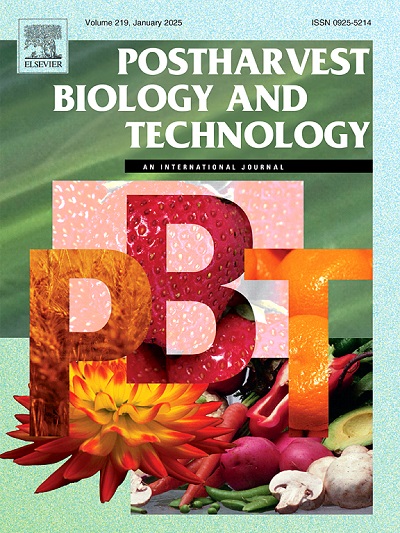储藏温度影响甜玉米的新陈代谢
IF 6.4
1区 农林科学
Q1 AGRONOMY
引用次数: 0
摘要
温度是影响甜玉米收获后贮藏质量的关键因素之一,但贮藏温度的影响尚未在分子水平上得到阐明。本研究调查了 0 ℃、4 ℃ 和 20 ℃ 储藏对质量的影响以及对转录组和代谢组的相关影响。与 20 °C贮藏相比,0 °C和 4 °C贮藏的玉米棒与细胞壁分解有关的基因(PG、PE、BMY、β-Gal)表达上调,与木质素合成有关的基因表达下调,与蔗糖合成有关的 SPP、SPS 和 SUS 基因上调,与蔗糖分解有关的 IN、FK、HXK 和 PFK 基因下调。在 0 °C 温度下,除 ERFs 外,大多数参与乙烯生物合成和信号转导的基因都受到抑制,而赤霉酸合成和信号转导在该温度下最为活跃。近冻结温度还能抑制编码膜脂降解酶的 PLD、PLC 和 LOX 的表达,从而保持细胞膜的完整性。代谢组学和综合分析表明,在低温条件下,甜玉米中溶血磷脂、谷胱甘肽和 L-抗坏血酸的含量增加。这些结果有助于深入了解低温对甜玉米品质的影响。本文章由计算机程序翻译,如有差异,请以英文原文为准。
Storage temperature affects metabolism of sweet corn
Temperature is one of the critical factors affecting the postharvest storage quality of sweet corn, but effects of storage temperatures have not been elucidated at the molecular level. In this study, the effects of storage at 0 °C, 4 °C and 20 °C, on quality and associated effects on the transcriptome and metabolome were investigated. Compared with storage at 20 °C, cobs stored at 0 °C and 4 °C had up-regulated expression of genes associated with cell wall disassembly (PG, PE, BMY, β-Gal) and down-regulated expression of genes involved in lignin synthesis, the up-regulation of SPP, SPS and SUS involved in sucrose synthesis, and the down-regulation of IN, FK, HXK and PFK involved in sucrose catabolism. Most of the genes involved in ethylene biosynthesis and signaling were inhibited at 0 °C, except for ERFs, while abscisic acid synthesis and signal transduction were most active at this temperature. Near-freezing temperature also maintains the integrity of the cell membrane by inhibiting the expression of PLD, PLC and LOX, which encode membrane lipid-degrading enzymes. Metabolomics and combined analysis showed that the contents of lysophospholipid, glutathione and L-ascorbic acid in sweet corn increased at low temperatures. These results provide insight into the effects of low temperatures on sweet corn quality.
求助全文
通过发布文献求助,成功后即可免费获取论文全文。
去求助
来源期刊

Postharvest Biology and Technology
农林科学-农艺学
CiteScore
12.00
自引率
11.40%
发文量
309
审稿时长
38 days
期刊介绍:
The journal is devoted exclusively to the publication of original papers, review articles and frontiers articles on biological and technological postharvest research. This includes the areas of postharvest storage, treatments and underpinning mechanisms, quality evaluation, packaging, handling and distribution of fresh horticultural crops including fruit, vegetables, flowers and nuts, but excluding grains, seeds and forages.
Papers reporting novel insights from fundamental and interdisciplinary research will be particularly encouraged. These disciplines include systems biology, bioinformatics, entomology, plant physiology, plant pathology, (bio)chemistry, engineering, modelling, and technologies for nondestructive testing.
Manuscripts on fresh food crops that will be further processed after postharvest storage, or on food processes beyond refrigeration, packaging and minimal processing will not be considered.
 求助内容:
求助内容: 应助结果提醒方式:
应助结果提醒方式:


